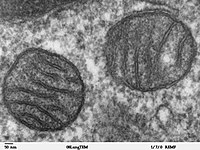
Photo from wikipedia
Jojoba is a dioecious shrub with female and male flowers in separated individuals. The plant native to North and Central American deserts, it’s cultivated in many other places worldwide for… Click to show full abstract
Jojoba is a dioecious shrub with female and male flowers in separated individuals. The plant native to North and Central American deserts, it’s cultivated in many other places worldwide for its valuable liquid wax. The male-biased ratio in cultivated jojoba affects the yield. To develop protein molecular markers for early gender differentiation, comparative proteomic study been conducted on male and female leaves. Using gel-based proteomic, 45 proteins were identified representing 19 different proteins with 18 known functions. The identified proteins were involved in photosynthesis, energy, metabolism and the respond to biotic and abiotic stress. Ribulose-1,5-bisphosphate carboxylase (Rubisco) and ATP synthase were the most abundant proteins in both male and female of jojoba leaves, both were upregulated in male compared to female. Both proteins have the potential to serve as protein biomarkers for early differentiation between male and female in jojoba plant. These results could help in better understanding the molecular mechanism of gender differentiation in jojoba.
Journal Title: Acta Physiologiae Plantarum
Year Published: 2017
Link to full text (if available)
Share on Social Media: Sign Up to like & get
recommendations!